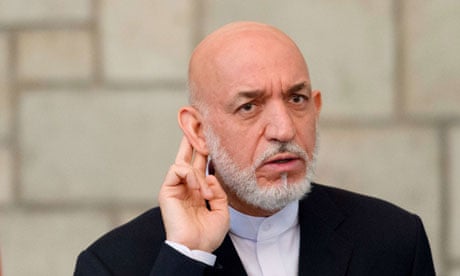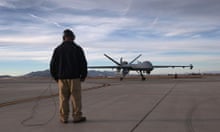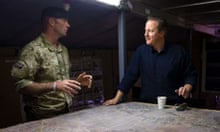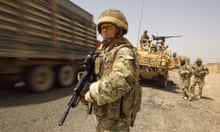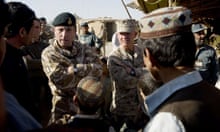After years of lavish spending in support of the now-waning military mission in Afghanistan, the west on Wednesday embarked on an attempt to reset its relationship with Kabul, demanding measurable progress in return for aid cash.
Afghanistan has been promised around $8bn (£5.2bn) a year in military and development spending after foreign troops leave in 2014. But Nato governments say the aid money comes with strings attached.
A meeting on Wednesday in the Afghan capital aimed to be the first step in this "paradigm shift", grading the country on progress towards goals agreed last year in Tokyo.
But the assessment was sombre, despite praise for an unexpectedly "realistic" discussion. Only three of 17 benchmarks had been met in full, one western official said, and Afghanistan's president, Hamid Karzai, was notable by his absence from a high-profile meeting held just a stone's throw from his palace.
Failures picked over include parliament's dithering over election laws that could result in the country going into a crucial presidential poll next year with no legal framework, the feeble sentences handed to the masterminds of the $900m Kabul Bank scandal and slow progress on asset recovery.
Donors were also unhappy with Karzai's unilateral choice of new members of the country's well respected human rights watchdog. One is a former member of the Taliban, another said she hopes to run for president and a third is a former police general.
The big question for Afghan officials keen to keep the cash flowing is what, if anything, the west plans to do about these failures. The last 10 years have been a catalogue of red lines drawn in the sand and then washed away, with criticism coming and going but funds staying more or less constant.
Diplomats insist that is now changing, and the attitude of Afghan bureaucrats, who have been largely impervious to outside pressure, will have to change as well.
"There is a paradigm shift underway in our relationship with Afghanistan and it is critical everyone is aware of that," said a western official. "It's about teaching Afghans to readjust themselves, as the times of complacency are gone."
Last year in Tokyo Afghan and international diplomats hammered out a "mutual accountability" pact. It committed the west to long-term support, but Afghanistan to substantial change in return, particularly tackling corruption and protecting democracy and women's rights.
For Washington and its allies much is at stake, primarily their hopes of leaving a government credible enough to hold onto power when Nato's military might is gone. They also need leaders who can justify unprecedented aid spending on a single country.
"We have said again and again, progress is needed for us to be able to justify sustained levels of support," said one US official.
Those concerns put human rights and elections top of the agenda in Kabul. If next year's presidential poll goes smoothly it be the first peaceful transfer of power in Afghanistan since 1901. "A free and fair election still remains the primary benchmark," said Mark Bowden, deputy head of the UN in Afghanistan, after the meeting ended.
For the Afghan government too the stakes are high. For all its much-vaunted independence as the "graveyard of empires", most of Afghanistan's rulers since the 19thh century have been dependent on foreign cash, skilfully playing off bigger powers to extract revenue in the form of development cash or straight-up subsidies and arms deliveries.
The current one is no exception. Revenues have already started falling on the back of Nato's downsizing, making foreign cash even more important.
And while divided about when to use carrots and sticks, the international community has made some first tentative moves towards punishing failure. The EU recently held back €20m ( £17m) earmarked for a justice programme. Donors are eyeing other controls, and warn that Kabul will have to work harder at meeting the Tokyo goals.
"There was a lot of emphasis on the current extraordinary levels of aid. Faster progress with reforms, tackling corruption and especially ensuring credible elections are all essential if these levels of aid are to be sustained," another western diplomat said after the meeting.
